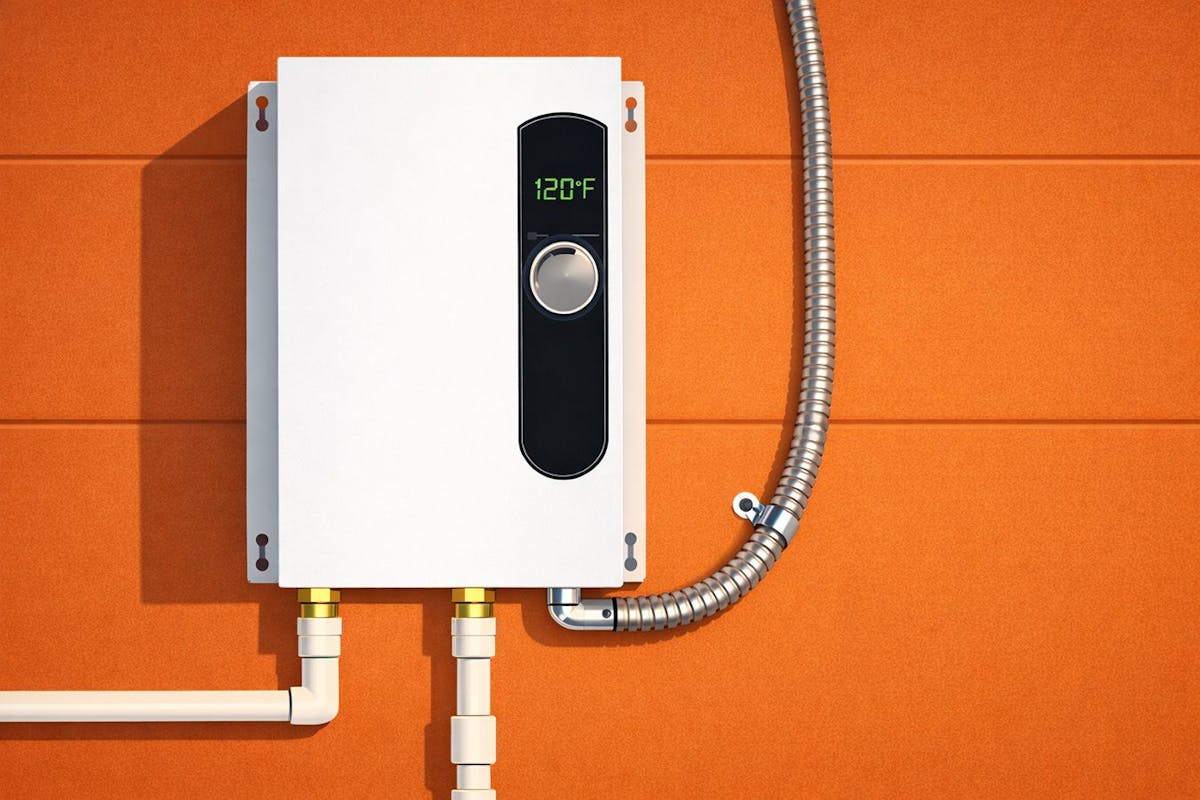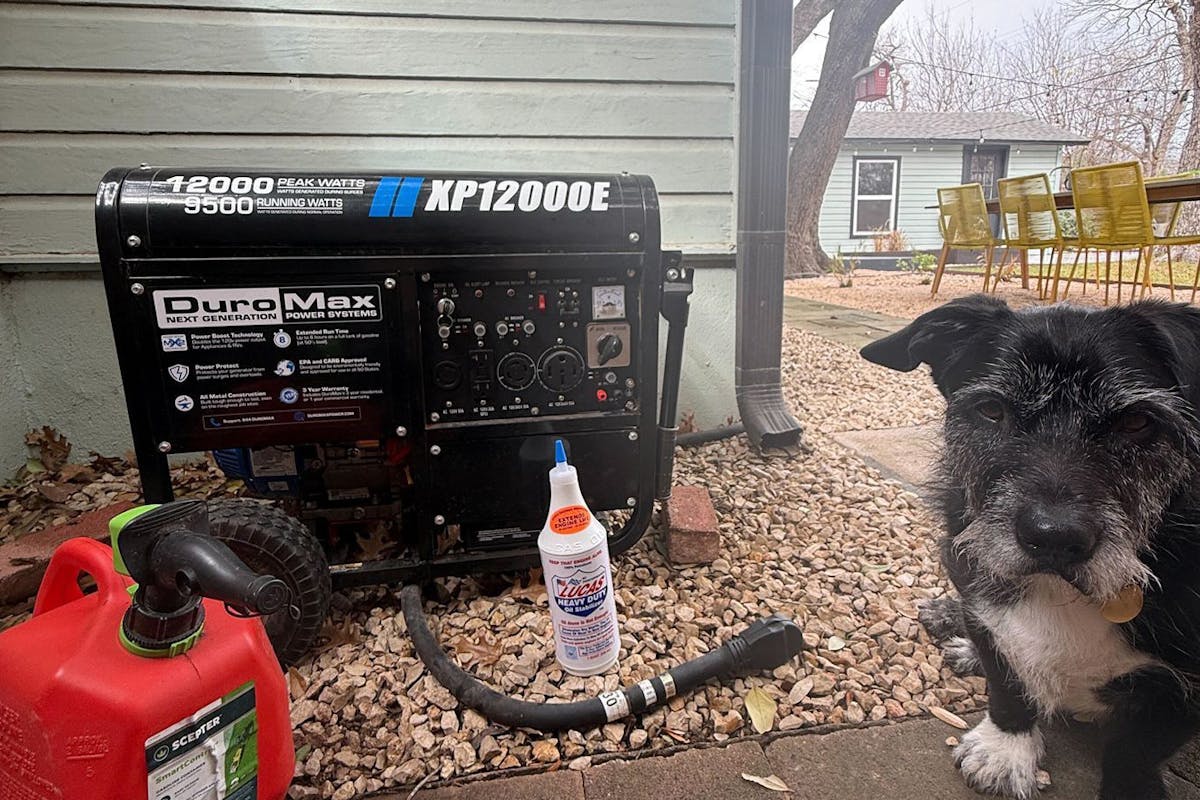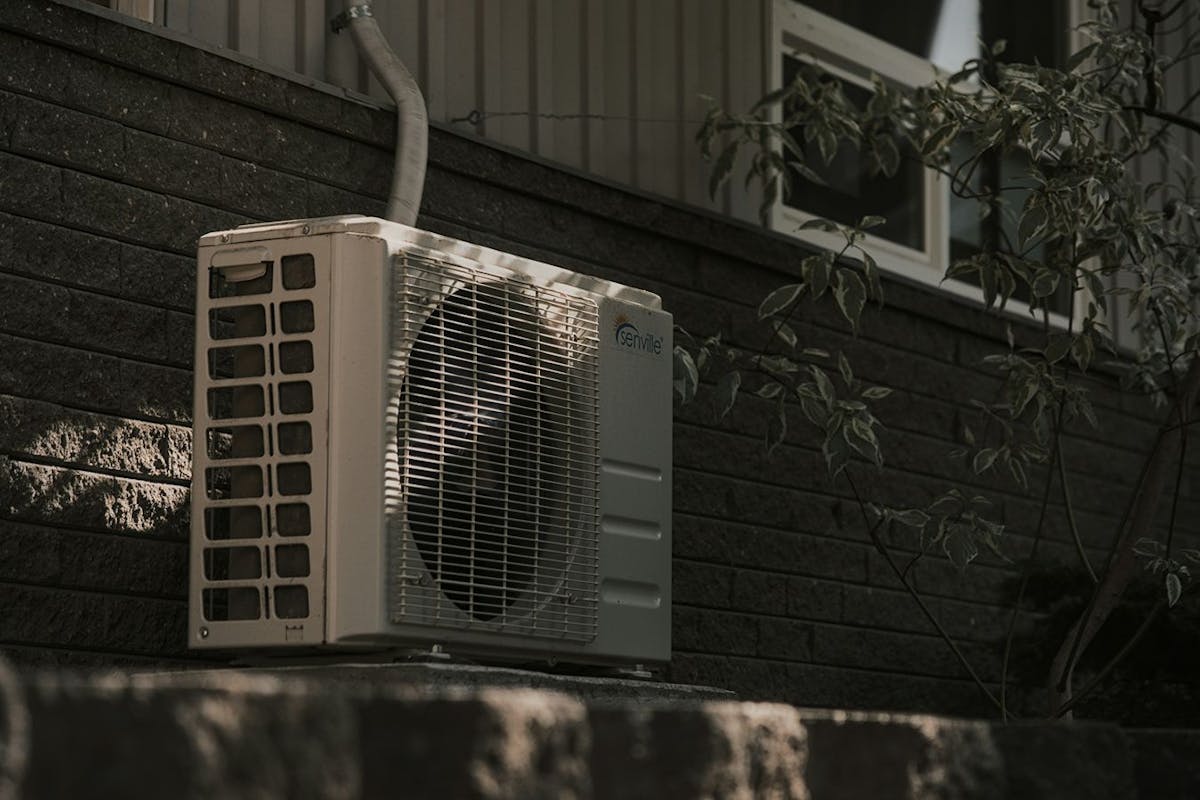Electric and Heat Pump Water Heaters Guide: Pros and Cons
Last edited
Author
Andrew Giermak
Solar and Electrification Writer and Editor
Editor
Andrew Blok
Electrification and Solar Writer and Editor

With any luck, your water heater is humming along, providing you with the hot water you need, and requiring no additional thought. But, depending on your water heater, a little extra thought may be worthwhile.
Water heaters account for about 18% of the average home’s energy usage. With rising energy prices, a new water heater could be an opportunity to save. Or, you could find one that cleans up your home energy consumption or better fits your lifestyle. Here’s what you need to know about electric water heaters.
See how much you can save with home energy changes
What is an electric water heater?
These types of electric water heaters are the main options on the market:
- Conventional: Electric heating elements inside of a water heater tank heat the water. The tank size determines how much hot water you have available, and the water is kept heated at all times.
- Tankless: Also known as instantaneous water heaters, tankless water heaters use electric coils to heat water only when you need it. These can be centrally located or located where the water will be used (point of use).
- Hybrid/heat pump: Heat pump water heaters draw in heat from the air or ground, making them more energy efficient.
- Solar: While not traditionally part of the electric water heater group, solar water heaters use electricity and the heat of the sun to warm water.
What is a heat pump electric water heater?
A heat pump water heater does its job with high efficiency. While conventional and tankless water heaters consume electricity to create heat, a heat pump water heater uses it to move heat from the air or ground into the water.
You can think of this technology as a refrigerator in reverse. Instead of moving heat out of your fridge to cool your groceries, the water heater’s evaporator coil takes in heat from the air to heat your water.
By capturing ambient heat, the appliance requires less total energy to get your home the hot water it needs.
As a result, a heat pump water heater can use up to 60% less electricity than other types of water heaters, water heater manufacturer Rheem says. Depending on how it’s installed, a heat pump water heater can provide the additional benefit of cooling spaces, too.
Electric water heater pros and cons
What type of water heater you choose depends on your needs and your home’s design. Each comes with its own set of pros and cons.
Conventional electric water heater pros and cons
| Pros | Cons |
|---|---|
| Familiar technology | Hot water limited to tank size |
| Least expensive to install | More expensive to operate |
Tankless electric water heater pros and cons
| Pros | Cons |
|---|---|
| Water heated only when needed | More expensive to install |
| Not limited by tank size | Installation may be more complex |
| Greater energy efficiency |
Heat pump water heater pros and cons
| Pros | Cons |
|---|---|
| Most energy efficient | Hot water limited by tank size |
| Lowest energy costs | More expensive to purchase and install |
| Can work in tandem with an HVAC heat pump | Higher space requirement |
Electric vs. gas water heaters
Fuel source isn’t the only difference between electric water heaters and gas water heaters.
Capacity
Both gas and electric water heaters should be able to meet your needs, whether you’re heating water for one or a large family. When it comes to storage water heaters, here’s a quick rule of thumb for sizing the tank.
- 1 or 2 people: 26-36 gallons
- 2 to 4 people: 36-46 gallons
- 3 to 5 people: 46-56 gallons
- 5 or more people: Add 10 gallons per additional person
Installation
The differences in installation have more to do with the type of water heater than whether it’s gas or electric. However, if you don’t already have gas service to your home, sticking with an electric water will be the more affordable choice.
See how much you can save with home energy changes
Cost
The difference in cost to operate a gas or electric water heater comes down to the local cost of gas and electricity.
One thing is certain: an electric heat pump water heater will cost less to run than other electric options.
Safety
Properly installed water heaters don’t pose major safety risks. Any time gas is involved there’s a risk of a dangerous gas leak. If you suspect leaking gas, address the issue immediately.
Another aspect of water heater safety is the temperature you set your water heater to. Reducing the temperature setting to 120 degrees from the common factory default can help reduce your energy bills.

Energy consumption by end use in American homes. Credit: EIA
Lifespan
Because electric water heaters operate more cleanly than gas, you can expect them to last for a few years longer than their gas counterparts.
- A gas water heater can last between 8 and 12 years, though an electric model can run up to 15 years.
- Tankless water heaters can last up to 20 years because they aren’t constantly running to keep a full tank of water warm.
- Heat pump water heaters can last up to 15 years on average.
Pairing with solar panels
The electricity a water heater uses can be offset with clean, affordable electricity from rooftop solar panels. There’s no bill-reducing home solution for generating natural gas.
Powered with solar panels, an electric water heater operates cleanly and cheaply. Even the best-maintained, most efficient gas water heater produces carbon emissions while heating water. Not to mention the emissions associated with the production and transportation of natural gas.
Benefits of an electric water heater
Compared to heating your water with gas, there are many benefits to using an electric water heater.
- An electric water heater is more efficient since it doesn't lose energy to venting.
- You don't run the risk of having a gas leak or producing carbon monoxide.
- If you have solar panels, it can be much less expensive to run an electric water heater.
- Electric water heaters running on solar power are also more environmentally friendly than running your heater on gas or powering it with electricity generated from fossil fuels.
- You can spend less money on the electric water heater upfront, and if you have solar panels, you can also spend less money operating it, as well.
If your goal is to be environmentally friendly and save money, installing solar panels can be a great way to do both. Once you have solar panels, it is in your best interest to use as many electric appliances in your home as you can. This is called electrifying the home, and it helps maximize the value of the power you generate from your solar panels while also reducing your overall reliance on fossil fuels.
See how much you can save with home energy changes
Tax credits for water heaters
Federal tax credits for electric water heaters, electric heat pump water heaters, and solar water heaters will expire on Dec. 31, 2025. You may be able to find rebates from your state for energy efficient appliances like heat pump water heaters.
When it comes to claiming tax credits and planning for them, be sure to consult your own tax professional.
How to shop for an electric water heater
When it comes time to replace your water heater, most people just get the newer version of whatever they had before. Consider all options when choosing your new water heater and it could pay off.
If you switch from gas to electric, you will need an electrician and a plumber to prepare your site for installation and change the hardware over. Some of the top factors you should consider when shopping for an electric water heater include:
- Type: You can choose a traditional storage tank, tankless/on-demand, solar-powered, or a heat pump electric option.
- Capacity: You want to ensure you get a water heater that can keep up with the number of people in your home so you don’t run out of hot water when you need it most.
- Size: Measure the space you have designated for your water heater and find one that fits that space.
- Energy efficiency: Find a water heater that is Energy Star certified for high efficiency. Energy Star water heaters can save the average house of four more than $5,000 over its lifetime compared to a standard conventional electric water heater.
The best electric water heater brands
Many different companies produce electric water heaters, but these companies are popular and known for their quality.
- A.O. Smith: A leader in water heaters, but only available through local plumbing contractors.
- Bosch: Known for their point-of-use systems.
- Bradford White: Has been manufacturing water heaters since 1881, with manufacturing facilities located in the U.S.
- EcoSmart: Known for their tankless water heaters.
- General Electric: Makes GeoSpring, an electric heat pump water heater line manufactured in the U.S.
- Navien: A growing leader in tankless water heaters.
- Rheem: Industry leaders for nearly 100 years, including heat pump water heaters.
- Stiebel Eltron: A leader in the development of tankless water heater technology.
Electric water heaters are great for solar-powered homes
Switching from a gas water heater to an electric one is likely going to raise your electricity bill. Using more electricity — whether for a new water heater, electric vehicle, or replacing your gas furnace with a heat pump — means it’ll cost more. You might pay less for gas, but you will pay more for electricity.
The good news is, while there’s no way to produce natural gas at home, you can produce your own electricity. Solar panels for your home can save you money by providing some or all of the electricity you would have otherwise bought from your utility. In fact, the higher your electric bills, the more potential for solar savings.
If you’re interested in your possible savings from home energy improvements, you can start by downloading the new Palmetto app. The app lets you estimate energy cost and savings for home improvements at your home. You can also explore Palmetto's Savings Maximizer or solar savings tool for information and estimates today.
See what home electrification can do for you:
Electric water heater FAQs
Will an electric water heater increase my utility bills?
If you’re replacing a gas water heater with an electric one, your electric bill will likely go up and your gas bill will likely go down. Highly efficient options, like heat pump water heaters, may be the cheapest to operate overall. Pairing an electric water heater with solar panels can also greatly reduce your operating costs.
How big of an electric water heater do I need?
Picking the right size electric water heater depends on how much hot water you need. For water heaters with tanks, the Department of Energy provides a worksheet to determine how much water you need in an hour, which can help you determine the appropriate water heater based on its first hour rating.
For tankless water heaters, you’ll need to estimate how much water you’ll need at one time in gallons per minute. Compare that to the tankless water heater’s flow rate.
How long do electric water heaters last?
An electric water heater can last up to 15 years, while a tankless one can last up to 20. Heat pump water heaters can last 15 years, too. These are estimates. Your actual water heater’s lifespan could be longer or shorter based on its use, whether it’s been properly maintained, and the quality of your water.
How can you reduce your water heating costs?
Here are a few practical steps:
- taking shorter showers
- washing your clothes with cold water
- reducing your water heater's temperature, which will save energy
- powering your water heater — and your whole home — with home solar panels.
- upgrading an inefficient electric water heater to an efficient one.


